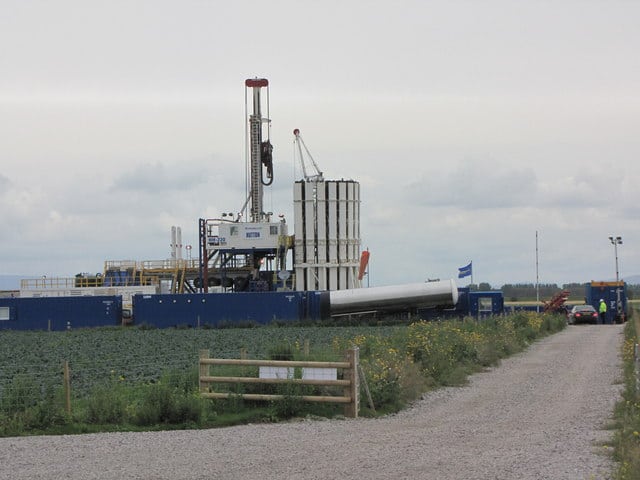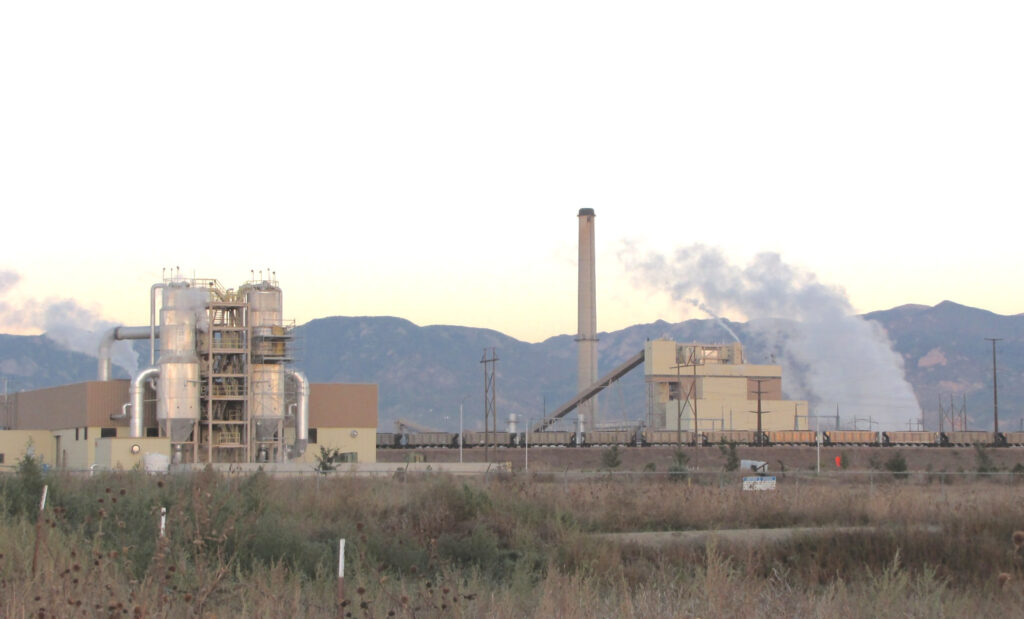This post originally appeared on Carbon Brief.
Fracking should be banned because it is incompatible with the UK‘s climate targets, according to the cross-party House of Commons Environmental Audit Committee (EAC).
The committee’s report has been rushed out in advance of a series of parliamentary votes this afternoon on the government’s Infrastructure Bill. Ten MPs have tabled an amendment to the bill that would ban fracking “in order to reduce the risk of carbon budgets being breached”.
This amendment also has cross-party support: it is backed by former Conservative environment secretary Caroline Spelman along with two other Conservatives, five Labour MPs and one each for the Liberal Democrats and the Greens.
The Labour Party says it will block UK fracking unless the government agrees to a series of environmental conditions set out in a separate amendment to the Infrastructure Bill.
The committee report and parliamentary votes come at a crucial time for the nascent UK shale gas industry. It is hoping to resume exploration activities, which have been on hold since causing earth tremors in 2011.
Last week, Lancashire council’s planning department said exploratory fracking at two sites should not go ahead, citing concerns over noise and traffic. The council’s planning committee was due to have voted on the plans this week until developer Cuadrilla asked for more time.
Carbon Brief takes you through the EAC‘s conclusions on fracking and the climate, and assesses the evidence behind its findings.
Fracking and climate change
Hydraulic fracturing, usually called fracking, is a technique used to extract gas from shale rock. Carbon Brief has a range of detailed briefings on shale gas and fracking, including on the scale of UK shale resources and where fracking might take place.
One of the foremost arguments made by fracking advocates is that shale gas can be a clean ‘bridging fuel’ on the road to a low-carbon future. Emissions from shale gas-fired electricity can be as low as half those from coal, as long as fugitive methane emissions are limited.
But the EAC says shale gas cannot be viewed as a bridging fuel for the UK.
It says that by the time UK shale gas comes on stream in the mid-2020s, the UK‘s coal-fired power stations are likely to have already closed for other reasons. Effectively there will no coal left for shale to replace. This conclusion is similar to the view of the Committee on Climate Change (CCC).
The CCC says the UK power sector should be almost completely decarbonised by 2030 if the UK is going to hit its climate goals. So there’s a limited window in which shale gas can be used to generate electricity, unless expensive carbon capture and storage (CCS) is added.
Even if it doesn’t continue to use gas for electricity, however, the CCC says the UK is likely to need gas for heating and industry until 2030 and beyond. UK shale gas might be more secure than imported liquified natural gas (LNG), which requires energy to compress and transport.
A report for the Department for Energy and Climate Change (DECC) by its former chief scientist Prof David MacKay says this is the most likely use for UK shale gas, and that using it in this way is likely to have a minimal net effect on UK greenhouse gas emissions.
Fracking ban
The MP‘s report questions this conclusion. It argues that fracking should be subject to a total ban, as proposed in the amendment to the Infrastructure Bill. It says this ban is needed “because [fracking] cannot be accommodated within our climate change obligations”.
This is a strong statement, so let’s take a closer look. Indeed, the EAC‘s conclusions elsewhere in its report are more nuanced, conceding a place for shale gas if CCS is deployed.
Joan Walley MP, the Committee’s chair, says in a prepared statement:
“Ultimately fracking cannot be compatible with our long-term commitments to cut climate changing emissions unless full-scale carbon capture and storage technology is rolled out rapidly, which currently looks unlikely.”
The committee report later says that a small amount of the UK‘s shale gas could be burnable within carbon budgets. It says:
“Continually tightening carbon budgets under the Climate Change Act will have significantly curtailed our scope for fossil fuel energy, and as a consequence only a very small fraction of the possible shale gas deposits will be burnable.
“A moratorium on the extraction of unconventional gas through fracking is needed to avoid the UK‘s carbon budgets being breached in the 2020s and beyond.”
The Climate Change Act 2008 commits the UK to a series of legally binding five-year carbon budgets that will get progressively tighter towards the ultimate goal of an 80 per cent reduction in greenhouse gas emissions by 2050, against 1990 levels.
A spokesman for the EAC tells Carbon Brief the key evidence for its position on fracking and carbon budgets came from John Broderick, a scientist at the Tyndall Centre for Climate Change Research.
In his evidence, Broderick argues that only three to four per cent of the gas estimated to be stored in the UK‘s Bowland shale can be burnt within the carbon budgets that will be in place after 2025. If carbon capture and storage (CCS) is rolled out widely, the exploitable proportion of Bowland gas would increase to no more than six per cent, Broderick says.
In other words, the UK could afford to burn some, but not very much, of its shale gas while remaining within its carbon budgets.
Global Climate
If the UK can’t burn much of its shale gas, it could export it instead. The Intergovernmental Panel on Climate Change says gas could play a limited role in the global decarbonisation effort. That’s on the condition it replaces coal, that it is extracted with limited fugitive emission, and that global gas production is declining below today’s levels by mid-century.
But the MacKay report’s take on exploiting UK shale in the global context says this is risky:
“Without global climate policies (of the sort already advocated by the UK) new fossil fuel exploitation is likely to lead to an increase in cumulative greenhouse gas emissions and the risk of climate change.”
MacKay tells Carbon Brief that the exploitation of any new fossil fuel sources will face the same problem, which is not unique to UK shale gas. MacKay says that his report’s focus on cumulative global emissions is “essential”. What that means is that an increase in emissions due to UK shale exploitation could be balanced with emissions reductions elsewhere.
MacKay tells Carbon Brief:
“To give an example of a credible way in which additional production of gas could be consistent [with climate action], government could ensure that additional carbon capture and storage takes place, in proportion to the quantity of produced gas.”
Another study suggests most shale gas in Europe will have to remain in the ground if the world is to avoid dangerous climate change. Broderick echoes this study’s conclusions, saying that UK shale gas might be too expensive to extract if serious climate action is taken.
Maximum impact
The committee’s report has been timed to have maximum impact on the UK shale gas debate. Its conclusions will disappoint senior government figures, including the prime minister David Cameron, who has pledged to go “all out” for shale.
Conservative former environment secretary Caroline Spelman’s backing for the proposed fracking ban adds insult to injury, as it undermines energy minister Matt Hancock’s suggestion that only the Greens oppose fracking in the UK.
The committee’s conclusion that fracking is incompatible with UK climate targets appears to go slightly beyond the evidence behind the report. But if MPs vote for a fracking ban today, it will hardly matter.
Broader environmental concerns
The committee makes a range of other recommendations around the safe exploitation of UK shale gas resources. Here’s a summary:
-
Fracking restrictions in areas near drinking water wells should be expanded to cover all Groundwater Source Protection Zones. At present only zones closest to wells are protected.
-
There should be “clear and accessible” public disclosure of chemicals used in fracking.
-
Automatic rights to access shale deposits should be removed from the Infrastructure Bill. The government should also drop planned changes to trespass law, which would remove landowners’ ability to seek to block fracking under their land.
-
The cumulative impact of multiple fracking sites should be considered during government environmental assessments. All fracking activity should be subject to environmental impact assessment requirements.
-
Operators’ monitoring at fracking sites should be supplemented by independent monitoring “in all cases”. Regulators should make “regular” surprise inspections and audits. Abandoned wells should be subject to mandatory monitoring.
-
A planned insurance mechanism to cover liability in the case of accidents “must be in place” before any fracking takes place.
-
A government report on the impacts of shale gas in the rural economy, published only in heavily redacted form, should be released in full “as soon as possible”.
A large number of amendments to the Infrastructure Bill have been tabled, including several that would implement the recommendations of the EAC summarised above. The amendments will be subject to a series of Parliamentary votes between roughly 15.30 and 22.00 today.
Photo: Creative Commons
Subscribe to our newsletter
Stay up to date with DeSmog news and alerts






